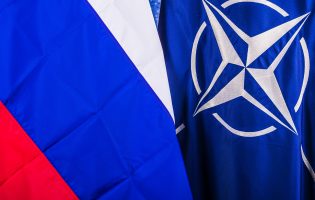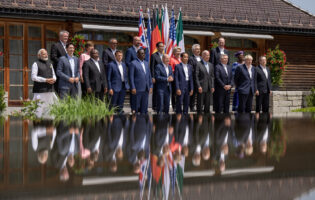The Euro Zone Crisis & Transatlantic Relations
On June 30, 2010, the American-German Institute (AGI) and the Representative of German Industry and Trade hosted a seminar on “The U.S., the Euro-Zone Crisis, and Transatlantic Relations,” which was generously funded by the German Academic Exchange Service (DAAD) and the Representative of German Industry and Trade, with additional support from the AGI Business & Economics Program. Keynote speaker Peter Rashish and panelists David Campbell, Stormy-Annika Mildner, and Nicolas Véron discussed the Transatlantic Economic Council (TEC), trade relations, energy policy, and financial regulation on both sides of the Atlantic.
Peter Rashish, Vice President for Europe and Eurasia at the U.S. Chamber of Commerce, began his keynote speech with the remark that the euro-zone crisis will make the European Union a less important partner for the U.S.; however, the EU’s importance as an international actor on international markets will increase. Even though the U.S. and EU agreed on more and better cooperation around the reduction of tariff barriers, achieving such goals within the framework of the TEC over the past few years has been slow. This has mainly been caused by cultural and traditional differences. The Lisbon Treaty provides an opportunity for better trade relations, but only if the EU member states allow this. While the euro-zone crisis created doubts about the transatlantic relationship, the G20 summit in Toronto is an opportunity for the EU and U.S. to reaffirm their common values and understanding. To that end, Mr. Rashish suggested focusing on trade liberalization. Turning to Germany, Mr. Rashish stressed the country’s positive contribution to ending the crisis. Although Germany was criticized for its behavior at the beginning of the Greek crisis, in reality, Germany’s approach boosts GDP and economic growth and at the same time creates jobs.
Three panelists then presented their findings on trade, energy, and financial regulation in response to Mr. Rashish’s remarks. Dr. Stormy-Annika Mildner, DAAD/AGI Fellow and Senior Researcher at the German Institute for International and Security Affairs, analyzed why there is so little progress in reducing trade barriers, in particular technical barriers to trade (non-trade market barriers, NTBs), when, statistically, the EU-U.S. trade relationship is the most important economic relationship globally. The level of integration across the Atlantic is very high and there is a mutual interest in expanding bilateral trade in goods and services. Even during the crisis, the transatlantic trade market demonstrated relatively high stability, with steadily growing investment flows. Less than 2 percent of the bilateral trade and investment volume are strained by trade conflicts. The average duties in transatlantic trade have – with the exception of a few areas such as agriculture and textiles, where tariffs are still much higher – reached a very low level of less than 4 percent. However, technical non-trade market barriers (NTBs) still pose grave obstacles for trade and investment. If those barriers were removed, both partners could realize substantial welfare gains.
Dr. Mildner further hypothesized that the transatlantic trade liberalization process is slow, with only a few quick results, due to the following factors: First, both the U.S. and the EU have other political priorities and diverging views on many issues such as government spending and macroeconomic imbalances. Second, there is a lack of active support for trade policy in the U.S. and political leadership on trade issues is weak. Third, institutional uncertainties occur due to problems facing the TEC, as well as diverging views on its tasks and future. The fourth factor is the different risk perceptions and regulatory approaches. In comparison to U.S. regulators, their European counterparts give more weight to risk avoidance over cost/risk-benefit analysis and to public preferences over scientific risk assessments. When faced with uncertainties about the risks of products (for example GMOs, hormone-infused beef, chlorinated chicken), European regulators are much more willing to take precautionary measures than their American counterparts (the precautionary principle). Additionally, Europeans like to regulate before the problem emerges, while U.S. regulators generally wait until after the problem comes to light. A further factor that impedes closer cooperation is a lack of trust in the trade partner’s intentions: the EU points to consumer safety when, for example, defending its import ban on chlorine-treated poultry; the U.S. views this as a hidden agenda to protect Europe’s agricultural sector. The last factor mentioned by Dr. Mildner was the search for new markets elsewhere. The U.S. is negotiating the Transpacific Partnership Agreement while the EU is negotiating bilateral trade agreements with Asian and South American countries; thus, EU-U.S. integration is not the priority. As long as trade is not a first priority for both partners, it will be very difficult to enhance trade cooperation. Dr. Mildner suggested shifting the focus of the TEC to the development of standards in new industries and goods such as energy efficiency technology or nanotechnology.
David Campbell, Director of Trade Policy, Climate, and Energy at the Representative of German Industry and Trade, focused on German-American cooperation on energy. The German energy mix is similar to the U.S. energy mix. For instance, renewable energy in Germany accounts for 9 percent of primary energy resources against 7 percent in the U.S. Mr. Campbell stressed that the production of green energy should be increased to create profit and jobs on both sides of the Atlantic. While energy use per GDP is similar between Germany and the U.S., thanks to forward-looking environmental policies and superior household energy efficiency measures, Germany has substantially lower energy use on a per capita basis. In the private sector, German companies confront significantly higher electricity and natural gas prices compared to their American competitors. To improve transatlantic energy cooperation, the EU-U.S. Energy Council as well as the Innovation Action Partnership, a senior-level government-to-government forum in the TEC, were created. Mr. Campbell underscored that the Innovation Action Partnership can bolster U.S. and EU efforts to spur growth, productivity, and entrepreneurial activity by sharing best policy practices and identifying steps that will improve the policy environment for innovative activities across the Atlantic. In broad terms, there will be opportunities, such as the creation of new jobs or cooperation with third nations on the basis of common values and principles, as well as challenges, such as obtaining useful input from industry. Well-intentioned transatlantic cooperation requires coherence, communication, transparency, and focus, but it can be difficult to reach a consensus.
Nicolas Véron, Visiting Fellow at the Peterson Institute for International Economics and and Senior Fellow at Bruegel, stressed the change of the nature of discussions caused by the crisis. In general, the U.S. is quicker in organizing new ways to regulate within a new environment, while the EU has so far done little to find new regulation mechanisms. The two have different approaches to the crisis: some European states have designed new regulations, but there is no consensus on the EU level, while the U.S. has been focused on domestic politics. Although the implications of the crisis have not yet been fully explored, the discussion about the banking sector has changed. The idea of a “global bank” is no longer imaginable. Capital markets are increasingly integrated but there is no common functioning governance system, which would be necessary to reduce the existing tensions between the different countries. Nevertheless, there is still the vision of a global system, including a global financial dialogue and global cooperation, like the forum for regular cooperation on banking supervisory matters at the Basel Committee on Banking Supervision. To enact better financial regulation, Mr. Véron recommended developing an integrated global framework for markets.







